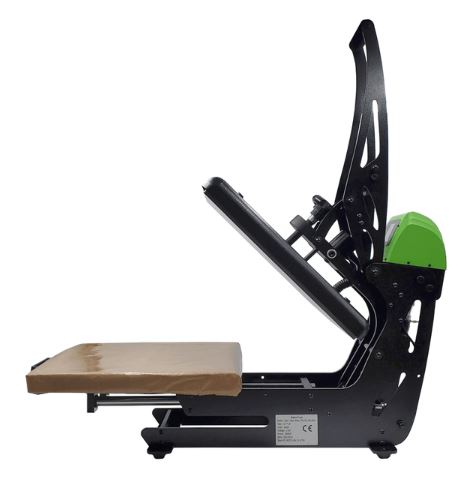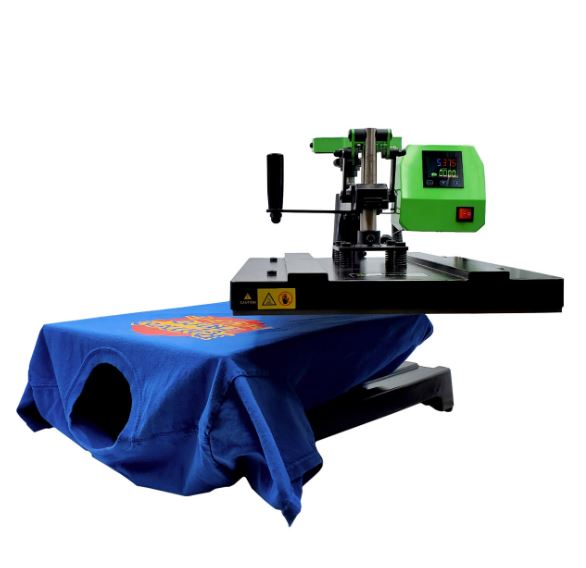How To Use a Heat Press Machine
Jan 30th 2023
A heat press machine is a versatile tool that allows you to transfer designs and logos onto a variety of materials, such as t-shirts, hats, bags, and more. These machines use heat and pressure to transfer ink or transfer paper onto the material, resulting in a professional-grade finish.
Whether you're a small business owner, hobbyist, or just looking for a fun DIY project, a heat press machine is a great investment for anyone looking to create custom designs on a variety of materials. Let’s take a look at how to use one.
Setting up the Heat Press Machine
Setting up your heat press machine is going to be simpler than many people realize. They aren’t complex machines, and they are often constructed to be very user-friendly.
The first thing you need to do is make sure the heat press machine is located where it will be needed. If it’s not located on a mobile cart, a single person may need assistance to lift or otherwise position the machine where it will be used. If it has been put on a caddie or cart, it can just be wheeled into place. If the press has a shipping bold installed, you’ll need to remove that.
The heat press also needs power, so you’ll need to locate the power cord, and plug it in. For some models, particularly smaller ones, the cord may be fully detachable, meaning you’ll need to plug it into the press, then the wall outlet.
Before turning it on, open the press. Then turn on the power switch, and look for status messages or other indicators of issues. Then you’ll need to set your time, temperature, and pressure, which will all have a significant impact on the results of your pressing. Be sure to follow the manufacturer’s instructions as well.

Preparing the Material
A heat press machine can be used to press a variety of materials, including t-shirts, hats, bags, and more. However, in order to achieve a successful press, it is important to properly prepare the material before using the heat press machine.
One of the first steps in preparing the material is to clean it. This is particularly important for materials like t-shirts, which may have small stains or marks that could show through the design after it is pressed. It is also important to ensure that the material is free of any wrinkles or creases, as these can also affect the final result.
Once the material is clean and wrinkle-free, it should be positioned on the press bed. This typically involves laying the material out flat and ensuring that it is centered on the press bed. It is important to pay attention to the placement of the material, as this will affect the final result. For example, if you are pressing a design onto a t-shirt, it should be centered on the chest of the shirt.
It is also important to consider the type of design or image you are going to be pressing onto the material. If you are using a printed image, it should be of high quality and be properly aligned with the material. If you are using heat transfer vinyl, you should have the right size and color material for your design.
Lastly, when positioning the material on the press bed, it is important to use a heat-resistant cover sheet to protect the material from the heat of the press and to ensure a successful press.
Pressing the Material
Once the heat press machine is set up and the material is properly prepared, it is time to press the material. The steps for pressing the material include adjusting the temperature and pressure settings, placing the material on the press bed, and closing the press.
To begin, adjust the temperature and pressure settings on the heat press machine to the appropriate level for the material you are pressing. Different materials have different recommended temperature and pressure settings, so it is important to consult the manufacturer's instructions or do some research to determine the appropriate settings for your specific project.
Next, place the prepared material on the press bed, making sure it is positioned correctly and centered on the press bed. Close the press and apply pressure to the material for the recommended amount of time. The time will vary depending on the material, the design, and the settings you have chosen.

It's important to keep an eye on the press during this process, as it can get hot and cause a burn. It's also important towear protective gear, such as heat-resistant gloves, to protect your hands from the heat.
To ensure a successful press, it can be helpful to use a heat-resistant cover sheet, which can help protect the material from the heat and also prevent any unwanted transfer of the design. Another tip is to press multiple layers at once, which can help to achieve a more even and consistent press.
When the press is complete, it's important to open the press carefully and allow the material to cool before handling it. Once the material is cool, it can be removed from the press bed and the design should be fully transferred to the material.
Cleaning and Maintenance
Cleaning and Maintenance is discussing the importance of regular cleaning and maintenance for the heat press machine. It provides tips for cleaning the press bed, platen, and other parts of the machine. Regular cleaning and maintenance help keep the machine in good working condition and ensure that it produces high-quality results. Tips include cleaning the machine after each use, wiping down the plate with a damp cloth, and lubricating the moving parts.
A heat press machine is a versatile tool that allows you to create professional-quality designs on a wide range of materials. From setting up the machine and preparing the material, to pressing the material and cleaning and maintaining the machine, there are many steps to consider when using a heat press. By following these steps and taking the necessary safety precautions, you can achieve high-quality results that will take your projects to the next level.

